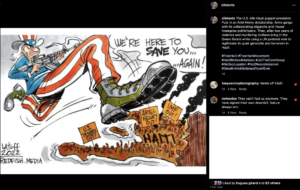“Even assuming that Haiti had a government that was willing to act in the interests of the majority of its people, it is hard to imagine how it could be expected to bring about significant change because of the inherent difficulty in transforming Haiti’s peripheral position and relative powerlessness vis-a-vis other States and international institutions within the global capitalist system.” —Haiti: The Structural Difficulties of “Building Back Better” ******************
Haiti: The Structural Difficulties of “Building Back Better”
by Kirsty M. Bisset / May 16th, 2011 | Original Source: Dissident Voice
What change the electoral victory of Michel Martelly will bring for the majority of the Haitian people is questionable. The poorest country in the Western Hemisphere, Haiti has a history of colonialism, dictatorship, corruption, and political instability, and everyday life for the majority of its people remains a desperate struggle against extreme poverty. Over one year on from the devastating January 2010 earthquake, little reconstruction has begun and 1.5 million people remain displaced and without access to basic services.
It is clear that the Haitian people desperately need decisive action to be taken towards rebuilding the country. However, Martelly is an ardent proponent of neoliberalism, and a supporter of the 2004 coup against former president Aristide and remain staunch opponents of Lavalas, the only political party in Haiti to attempt to improve the lives of the poor. Worryingly, he also has ties to the Duvalierist order and plans to reinstate the Haitian Army. His victory represents simply a continuation of the existing iniquitous order, with statements that Haiti is “open for business now” strongly suggesting that plus ça change, plus c”est la m ême chose.
In order for the significance of these contemporary events to be fully understood though, they must be situated within Haiti’s history of subordination and exploitation and the context of global power relations, along with the influence that the international community has long had in Haiti’s domestic affairs. The problems which prevent real change in Haiti are arguably systemic, rooted in Haiti’s history of exploitation and exclusion, and corresponding lack of power within the world-system.
The Haitian people were given very little say in terms of the election itself. The international community pressured the Preval government to drop specific candidates from the race, in favour of positioning Mirlande Manigat and Michel Martelly in line for the runoff. This disjuncture between the Haitian people and the State is not new — few governments in Haitian history have obtained their position without the acquiescence of the US government. Such approval has always come with the requirement that Haiti’s government adopt specific policies in keeping with prevailing global economic orthodoxy. As a result, control over the State has generally remained strictly within the hands of the US (and the domestic elite) at the expense of the poor majority.
The neoliberal State building framework represents the contemporary manifestation of the historic inequalities of power between different States. First introduced to Haiti in the 1970s, it is based on the assertion that free-market reforms (a deceptive term given the need for heavy government interference to enforce such destabilising policy) and structural adjustment will generate economic growth, the benefits of which will eventually ”trickle down” to those below.
However, the majority of Haitians have experienced structural adjustment as spiralling social inequality and the further impoverishment. According primacy to the ”free-market” allows human life to be subjugated to the vagaries of the market and international capital. Statistics from a 2009 International Monetary Fund Report show that 76% of Haitians live on less than $2 a day- an increase from previous years. The drastic reduction of trade tariffs on rice during Clinton’s government left farmers unable to compete with heavily subsidised US products and set the country on a path towards import (and aid) dependence. This precipitated high rural-urban migration to seek work in export processing zones. Prior to the January 2010 earthquake unemployment stood at around 70% while wages fell in real terms below 20% of 1981 levels, while prices of basic commodities rose, culminating in riots in 2008. At the State level neoliberalism has continued to reproduce asymmetries in economic power between Haiti and the dominant States.
Despite the human cost of neoliberalism, and the very specific conception of ”progress” it is based upon, it remains hegemonic and continues to be promoted by the international community in the post-earthquake period. The Draft Private Sector Plan indicates that Haiti’s reconstruction will follow the same principles as previous international interventions in its economy. Haitian control over the reconstruction process is minimal: the Interim Haiti Reconstruction Commission (IHRC) accords fifty percent of the vote to Haitian members and the other fifty to international donors, naturally including the US, France, Canada, the IMF, the World Bank, and the Inter-American Development Bank, but the Haitian members of the ICRC have complained of their excluded from the decision-making process, and the expectation that they approve decisions that have already been made.
The privatisation of relief and reconstruction efforts in the wake of the January 2010 earthquake can also be viewed as a continuation and expansion of neoliberal policy towards Haiti. Statistics indicate the existence of a burgeoning disaster economy where $98.40 of every $100 awarded in reconstruction contracts by the US government is consequently recycled back to the US from the local economy through the salaries of international aid workers/contractors. Reports show that jobs are often outsourced to foreign workers despite unemployment rates of 85%.
The overwhelming number of NGOs in Haiti (approximately 12,000) combined with how they operate continues to undermine the Haitian government. This is despite an ECOSOC Report emphasising “the need to shift from an NGO-driven model of development to a State-driven model” in order for there to be a level of transparency and accountability. The absence of adequate regulation erodes government capacity by permitting funds to be channelled to a multitude of different projects without any coordination between NGOs themselves or through consultation with the relevant government ministries.
NGOs share the objectives and ideology of their donors and are by no means apolitical. Their proliferation in Haiti can be traced to the ”rolling back” of the State in the 1970s where they effectively lent legitimacy to the neoliberal reforms through replacing the State as service providers. Certain NGOs also played a key role in destabilising the Aristide government when his cautious efforts to implement agrarian and educational reforms came up against the domestic and international elite with a vested interest in the enforcement of neoliberal reform. As the head of USAid recently stated, aid forms part of a strategy to achieve the economic goals of donor governments.
The feasibility of a State-driven model has been questioned due to Haiti’s weak institutions and heavily damaged infrastructure. Of course, according greater responsibility to the State would still entail extensive international support: Haiti desperately needs aid and reconstruction assistance. However, such resources ought to be used in such a way as to support rather than undermine the State, as is happening at present. The international community could use the reconstruction efforts to improve state capacity and public services. Perhaps a first step would be to reapportion power within the IHRC, enabling the Haitian board members to have more than a token role with regard to reconstruction. NGOs could be subject to proper regulation and coordination by government ministries, and in harnessing the resources and expertise they bring, have a more sustainable and coherent impact. Haiti’s numerous civil society organisations, largely excluded so far by the international community, also represent a significant untapped resource and could be used to fill in the gaps or complement the State where it lacks capacity. Such groups already have much experience of collective organisation and service provision and provide an existing infrastructure for resource allocation.
A State-driven model has much to offer in theory, but of course it must be asked: what type of State is envisioned here, and whose interests would it reflect? At present reconstruction nonetheless remains subject to the approval of the usual powerful actors and thus trapped within the parameters of dominant development ideology. Even assuming that Haiti had a government that was willing to act in the interests of the majority of its people, it is hard then to imagine how it could be expected to bring about significant change because of the inherent difficulty in transforming Haiti’s peripheral position and relative powerlessness vis-a-vis other States and international institutions within the global capitalist system. This problem is self-perpetuating: only candidates who will toe the neoliberal line are permitted to stand for election, whilst those that represent real change are prevented from participating. This further marginalises those individuals and groups who have the potential to transform Haiti if given the opportunity, and supported — rather than undermined — by the international community.
Haiti’s lack of economic power, rooted in colonialism and dictatorial rule, has never been adequately addressed and this power imbalance continues to be replicated today through the international community’s insistence on the neoliberal model. Debates surrounding Haiti must move towards a deeper critique that connects crises at the State level with dominant economic and development frameworks, and examine existing power structures that prevent real change. In the meantime the ongoing impoverishment and suffering of the majority of Haitian people remains a stark warning of the failures of the neoliberal State building project.
*******************************************************
Forwarded by Ezili’s Haitian Lawyers Leadership Network
********************************************************
Add a comment:
Powered by Facebook Comments









The Haitian Diaspora living abroad will have to emulate the same tactics of foreign oppressors in Haiti. And that is to pool our resources together, identify leaders in Haiti who are ready for martyrdom, assist them in every way possible in order for them to achieve the following goals:
1) Ownership of relevant Haitian mainstream media as a counter punch to state sponsored propaganda and lies. (our biggest weapon)
2) The creation of a Socialist Party with the primary goal of promoting socio-economic equality and HUMANISM.
3) The Push for a Nationalist Movement that restores National Pride, Protectionism, and rejects Maladaptive Trade Policies and Rapacious Monetary Policies.
4) Tighten Geo-Political ties with other countries with a more Progressive Agenda.
5) If necessary, Spearhead a Geo-Political Alliance with these countries.
6) Create a Private Militia to enforce âNaturalâ Human rights (right to shelter, food, and security)
7) Lastly if all else fails, Violent Resistance if necessary (by any means of “effective” resistance), the enemy is not bound by any rules, and so shouldnât we.